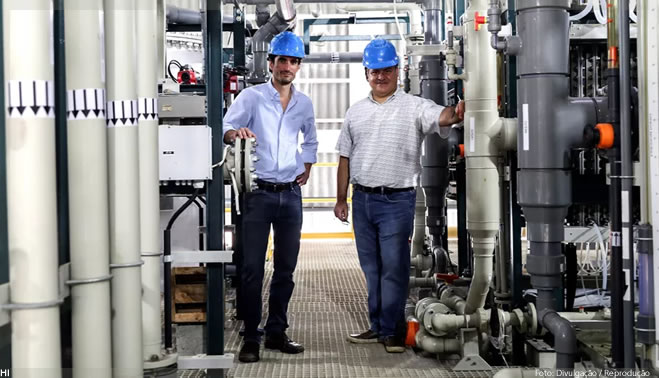Chlorum Solutions: Mini-factory model eliminates the need for transportation and reduces environmental impact
By Stella Fontes — From São Paulo
08/12/2020 05h01 Updated 08/12/2020

Daniel Croce (left), co-founder, and Alfredo Kerzner, CEO: the company assumes the investment in the manufacturing operation through long-term contracts — Photo: Disclosure
With the proposal to be the “Uber” of the chemical industry, Chlorum Solutions has received an investment of R$ 110 million and is directing these resources to expand its presence in the Brazilian market. The company, which has major shareholder investor Hersch Klaff and is headquartered in Chicago, installs and operates “mini-factories” of chlorine for its clients, taking on the investment in small-scale facilities that can be shared and serve different contracts. At the same time, the transportation stage of chlorine, which is costly and high-risk, is eliminated.
“We didn’t invent the product or the technology. What changes is the business model,” says the company’s CEO, Alfredo Kerzner. The identity of the new partners is not disclosed, but Klaff, who owns Klaff Realty, an investment firm in the real estate market with assets valued at $17 billion, remains the majority partner. The value assigned to Chlorum in the transaction is also not disclosed.
Today, Chlorum has three operational units—two in Brazil and one in Uruguay—and the investment will fuel an ambitious expansion plan. The strategic plan includes seven new plants in the next five years in Latin America, especially in Brazil. In Uruguay, the “mini-factory” was the first to utilize chlorine production technology through electrolysis with membrane cells, which has replaced systems that use mercury.
Chlorum’s contract model is known as BOO (from the English “build, own, operate”) and is long-term, to justify the initial investment in the facilities, which can be located within or near the consuming unit. The final product cost for the client, in turn, would not be higher, partly because the transportation stage—costly due to the product being toxic and the long distances between chlorine producers and consumers in the country—is avoided. Additionally, losses in scale and lower dilution of fixed costs can be offset by efficiency gains.
Also because of this model, Chlorum’s environmental impact is lower than that of large chlor-alkali production units, according to co-founder and president of Chlorum, Daniel Croce. “We believe there is a trend in the industry towards using smaller, local operations,” he said. While a company plant produces between 10 and 20 tons of chlorine per day, large factories can supply thousands of tons daily.
Chlorum’s first unit was built to supply the Gavião Water Treatment Station (ETA) of the Ceará Water and Sewage Company (Cagece) with 10 tons per day of chlorine and sodium hypochlorite production capacity. The ETA is responsible for supplying Fortaleza, so the unit that produces and injects chlorine directly into the water needs to operate 365 days a year, 24 hours a day. Previously, liquid chlorine was transported from Recife (PE) and stored under pressure at the ETA.
The second investment was made in Uruguay, and more recently, the company installed its third unit in the municipality of Codó, in the interior of Maranhão. Croce commented that the availability of input in more remote locations has proven to be a driver of development and new investments in that region.
In addition to the advantages of compact production, the legal framework for sanitation in the country is expected to boost the company’s business, according to executives. “Our clients are those who consume chlorine: from industries to water treatment stations, especially those that have to store liquid chlorine,” commented Kerzner.